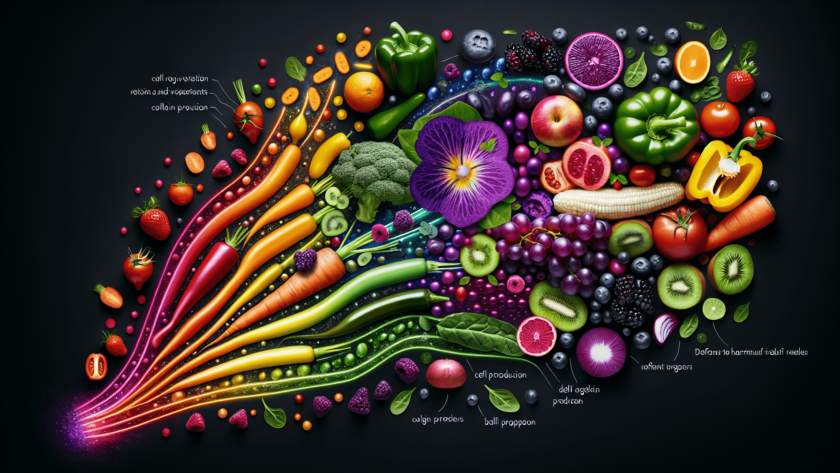Have you ever wondered how the food you eat affects the health and appearance of your skin? It turns out that your diet plays a significant role in the overall condition of your skin. From acne and wrinkles to dryness and dullness, what you put into your body can directly impact the way your skin looks and feels. So, whether you’re someone who indulges in junk food regularly or opts for a balanced and nutritious diet, understanding the connection between your diet and your skin is essential for achieving a radiant complexion.
Introduction
Overview of the relationship between diet and skin health
Your diet plays a crucial role in maintaining the health and appearance of your skin. What you eat can either benefit or harm your skin, as certain nutrients have a direct impact on its health and radiance. By understanding the relationship between diet and skin health, you can make informed choices about the foods you consume and promote clear, glowing skin.
Nutrients for Healthy Skin
Vitamins and minerals that promote skin health
To achieve healthy skin, it is important to consume a variety of vitamins and minerals that support its health. Vitamin A, for example, helps to promote cell turnover and reduce the appearance of wrinkles. Vitamin C plays a vital role in collagen production, promoting skin elasticity. Furthermore, minerals like zinc aid in healing and reducing inflammation, while selenium acts as an antioxidant to protect against free radicals.
Role of antioxidants in skin protection
Antioxidants are essential for maintaining healthy skin as they protect it from damage caused by free radicals. Free radicals are unstable molecules that can lead to premature aging and skin damage. Antioxidant-rich foods such as berries, leafy greens, and nuts are excellent choices to include in your diet as they provide a defense against oxidative stress, helping to keep your skin looking youthful and vibrant.
Importance of hydration for skin health
Proper hydration is crucial for maintaining skin health. When your body is well-hydrated, your skin appears plumper and more radiant. It is important to drink an adequate amount of water throughout the day to keep your skin hydrated from within. In addition to water, incorporating hydrating foods such as watermelon, cucumbers, and citrus fruits into your diet can also contribute to maintaining optimal skin hydration.
Foods for Clear and Radiant Skin
Benefits of fruits and vegetables for skin health
Fruits and vegetables are excellent choices for promoting clear and radiant skin due to their abundance of vitamins, minerals, and antioxidants. These nutrient-rich foods provide the necessary building blocks for healthy skin cell turnover, collagen production, and protection against free radicals. Including a variety of colorful fruits and vegetables in your daily diet can enhance your skin’s natural glow and promote a youthful complexion.
Omega-3 fatty acids and their impact on skin
Omega-3 fatty acids are healthy fats that offer numerous benefits for the skin. They possess anti-inflammatory properties, reducing redness and inflammation associated with skin conditions such as acne and eczema. Additionally, omega-3 fatty acids help to maintain the skin’s natural oil barrier, preventing dryness and promoting a supple complexion. Sources of omega-3 fatty acids include fatty fish like salmon, walnuts, and flaxseeds.
Protein-rich foods and their contribution to skin health
Protein is an essential nutrient for maintaining healthy skin. It plays a crucial role in the production of collagen, which provides structure and elasticity to the skin. Including protein-rich foods such as lean meats, poultry, fish, legumes, and tofu in your diet ensures an adequate supply of amino acids necessary for optimal skin health. These foods also aid in skin repair and regeneration, promoting a smoother and more youthful appearance.
Foods to Avoid for Healthy Skin
Effects of sugar and high glycemic foods on skin
Consuming excessive amounts of sugar and high glycemic foods can have detrimental effects on your skin. When you consume these foods, they cause an insulin spike, leading to increased production of sebum – the oily substance that can clog pores and contribute to acne breakouts. Additionally, a high intake of sugar can lead to glycation, a process that damages collagen and elastin, resulting in premature aging and the formation of wrinkles.
Negative impact of processed and fried foods on skin
Processed and fried foods often contain high levels of unhealthy fats, refined carbohydrates, and artificial additives that can negatively impact your skin. These foods can lead to inflammation within the body, triggering skin conditions such as acne and eczema. Opting for whole, unprocessed foods and healthier cooking methods, such as baking or grilling, can help preserve your skin’s health and minimize the risk of breakouts.
The role of dairy in promoting breakouts
Some individuals may find that consuming dairy products worsens their acne breakouts. Dairy products, particularly those with high levels of lactose and hormones, can stimulate oil production and inflammation in the skin. If you notice a correlation between dairy consumption and breakouts, reducing or eliminating dairy from your diet may help improve your skin’s clarity and reduce acne flare-ups.
The Gut-Skin Connection
Overview of the gut-skin axis
The gut-skin axis refers to the interconnected relationship between the health of your gut and the appearance of your skin. The gut houses trillions of bacteria collectively known as the gut microbiota, which plays a crucial role in digestion, immune function, and overall well-being. Disruptions in the gut microbiota can lead to inflammation and imbalances within the body, manifesting in various skin conditions.
Effects of gut health on skin conditions
Research suggests that an unhealthy gut can contribute to the development or exacerbation of skin conditions such as acne, eczema, and psoriasis. Imbalances in gut bacteria can trigger chronic inflammation, which impacts the skin’s natural barrier function and immune response. By maintaining a healthy gut through a balanced diet, you can support your skin’s health and potentially reduce the occurrence and severity of skin conditions.
Impact of a balanced diet on gut and skin health
A balanced diet that includes a variety of whole foods, fiber-rich fruits and vegetables, and fermented foods can support gut health and, in turn, promote healthy skin. Consuming probiotic-rich foods like yogurt, sauerkraut, and kefir can help restore beneficial gut bacteria. Additionally, incorporating prebiotic foods such as garlic, onions, and asparagus provides nourishment for the existing gut bacteria. A healthy gut microbiota is essential for maintaining vibrant and clear skin.
Understanding Food Allergies and Sensitivities
Difference between allergies and sensitivities
Food allergies and sensitivities are two distinct reactions to certain foods. Food allergies involve an immune response triggered by the body’s recognition of specific proteins in a particular food. In contrast, sensitivities are non-allergic reactions that do not involve the immune system but can still cause a range of symptoms. It is important to differentiate between the two to identify potential adverse reactions to certain foods.
Common food allergens affecting skin
Certain foods are more likely to cause allergic reactions that can manifest as skin issues. Common food allergens include peanuts, tree nuts, shellfish, eggs, soy, and wheat. If you experience symptoms such as hives, itching, or swelling after consuming these foods, it is advisable to consult with a healthcare professional to determine if an allergy is present.
Skin conditions linked to food allergies
In some cases, food allergies can contribute to the development or worsening of skin conditions. Conditions such as eczema and hives can be triggered or exacerbated by allergic reactions to specific foods. Identifying and avoiding these trigger foods is crucial for managing these skin conditions effectively.
Impact of Alcohol and Caffeine on Skin
Dehydrating effects of alcohol on the skin
Alcohol acts as a diuretic, meaning it increases urine production and can lead to dehydration. Dehydration can negatively impact the skin, causing dryness, dullness, and the potential for increased signs of aging. Limiting alcohol consumption and ensuring adequate hydration can help maintain healthy skin and prevent the negative effects of dehydration.
How caffeine affects skin hydration and aging
While moderate caffeine consumption is generally considered safe, excessive intake can dehydrate the body and affect skin health. Caffeine is a natural diuretic, which can increase urine production and lead to dehydration if consumed in large quantities. Over time, chronic dehydration can contribute to premature aging and the appearance of fine lines and wrinkles. Staying hydrated and enjoying caffeine in moderation can help minimize these effects.
Benefits of moderation and alternatives
Moderation is key when it comes to alcohol and caffeine consumption. Limiting alcohol intake and opting for hydrating alternatives, such as infused water or herbal teas, can help maintain optimal skin hydration. Similarly, moderating caffeine consumption and ensuring adequate water intake can prevent dehydration and its potential effects on the skin.
Weight Management and Skin Health
Effects of weight gain or loss on skin
Significant weight gain or loss can impact the health and appearance of your skin. Rapid weight gain can stretch the skin, leading to stretch marks and loss of elasticity. Conversely, rapid weight loss can result in sagging, loose skin. Gradual weight management and maintaining a healthy weight can help minimize these effects on your skin.
Role of a balanced diet in maintaining healthy skin
Adopting a balanced diet is crucial not only for weight management but also for maintaining healthy skin. Consuming nutrient-dense foods ensures your skin receives the necessary vitamins, minerals, and antioxidants it needs to remain healthy and vibrant. A balanced diet of lean proteins, whole grains, fruits, vegetables, and healthy fats provides the necessary nutrients for healthy skin and overall well-being.
Tips for maintaining a healthy weight for optimal skin health
Maintaining a healthy weight is key to optimal skin health. In addition to a balanced diet, regular exercise, adequate sleep, and stress management are important factors to consider. Engaging in physical activity helps improve blood circulation, which promotes a healthy complexion. Sufficient sleep and stress reduction contribute to overall skin health by allowing the body to repair and regenerate during periods of rest.
Skin Conditions and Dietary Recommendations
Acne: Foods to avoid and promote clear skin
Acne is a common skin condition characterized by the presence of pimples, blackheads, and whiteheads. While the exact causes of acne are multifactorial, certain dietary factors can contribute to its development or exacerbation. Avoiding high glycemic foods, processed sugars, and dairy products may help reduce acne breakouts. On the other hand, incorporating foods rich in antioxidants, omega-3 fatty acids, and probiotics can promote clear and healthy skin.
Eczema: Foods that may trigger or alleviate symptoms
Eczema is a chronic skin condition characterized by dry, itchy, and inflamed skin. While individual triggers vary, certain foods can potentially worsen eczema symptoms in some individuals. Common trigger foods for eczema include dairy, gluten, eggs, and soy. On the other hand, consuming anti-inflammatory foods such as fatty fish, leafy greens, and berries may help alleviate symptoms and promote skin healing.
Psoriasis: Dietary recommendations for managing flare-ups
Psoriasis is a chronic autoimmune skin condition characterized by red, scaly patches on the skin. Although diet alone cannot cure psoriasis, certain dietary choices may help manage flare-ups and alleviate symptoms. Consuming anti-inflammatory foods, vitamin D-rich foods, and maintaining a healthy weight can contribute to psoriasis management. Additionally, avoiding trigger foods like alcohol, red meat, and processed foods may help reduce the severity of symptoms.
Seeking Professional Advice
When to consult a dermatologist or nutritionist
If you have specific concerns about your skin health or are unsure about how your diet is impacting your skin, it is advisable to consult with a dermatologist or nutritionist. These healthcare professionals can evaluate your individual situation, assess any underlying conditions, and provide personalized recommendations tailored to your needs.
Importance of personalized dietary recommendations
Every individual’s dietary needs and skin health goals are unique. Personalized dietary recommendations take into account factors such as age, overall health, skin condition, and personal preferences. A personalized approach ensures that the dietary choices you make are tailored to your specific needs for optimal skin health.
Collaborating with healthcare professionals for optimal skin health
Collaborating with healthcare professionals, including dermatologists and nutritionists, can provide invaluable guidance and support for achieving and maintaining optimal skin health. They can offer evidence-based advice, monitor your progress, and provide ongoing support to help you reach your skin health goals. Working together with professionals ensures that your dietary and skincare choices are well-informed and aligned with your individual needs.
In conclusion, your diet plays a significant role in the health and appearance of your skin. By incorporating nutrient-rich foods, avoiding foods that may negatively impact your skin, and maintaining a balanced diet, you can promote clear, radiant skin. Remember to consult with healthcare professionals to receive personalized recommendations and guidance on achieving and maintaining optimal skin health.



